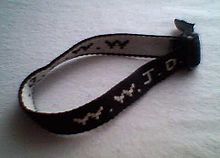
The phrase "What would Jesus do?", often abbreviated to WWJD, became particularly popular in the United States in the early 1900s, following the 1896 novel In His Steps: What Would Jesus Do? by Charles Sheldon.[1] The phrase saw a resurgence in the 1990s as a personal motto for Christians, who used it as a reminder of their belief in the moral imperative in a way that demonstrated the love of Jesus through their actions.[2][3] The resurgence of the motto in the 1990s stemmed from the WWJD abbreviation on wristbands that became popular among Christian youth groups.[2][3][4]
- ^ Downs, David. "What Does WWJD Mean?". www.wwjd.org. Retrieved September 9, 2024.
- ^ a b "What would Jesus do?: The rise of a slogan". BBC News. December 8, 2011. Retrieved March 14, 2021.
- ^ a b Helmeke, Karen B.; Sori, Catherine Ford (December 6, 2012). The Therapist's Notebook for Integrating Spirituality in Counseling I. Routledge. p. 150. ISBN 9781135884710.
In recent years, largely among Protestant and Catholic circles, the catch phrase "What Would Jesus Do" has become popular. The phrase is an attempt to call people to consider how Jesus Christ might respond to personal situations in daily life. While the idea of thinking about Jesus Christ might respond in a given situation is not new, the popularity of the catch-phrase "What Would Jesus Do?" or WWJD, has increased. Bracelets, keychains, T-shirts, bumper stickers, and other items initialized with WWJD have become commonplace.
- ^ "WWJD What Would Jesus Do Bracelets". Mortal Journey. Retrieved November 3, 2013.